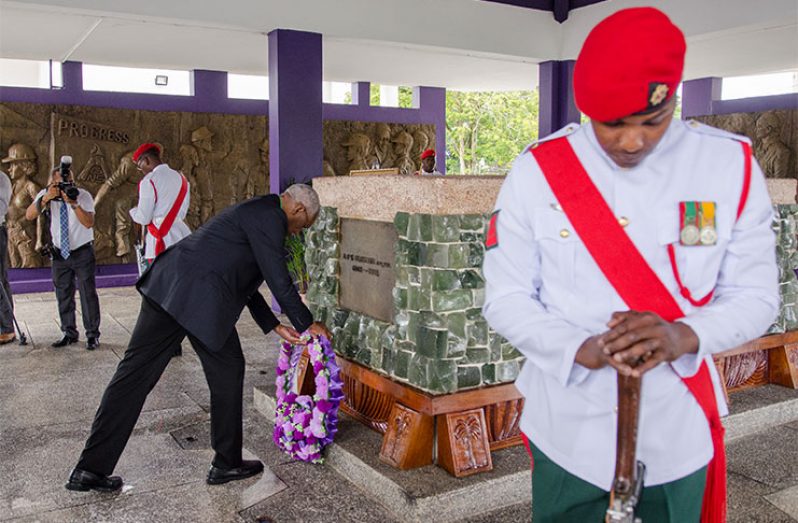…President Granger tells commemoration service
PRESIDENT David Granger has made a commitment to continue former President, Forbes Burnham’s legacy of free public education.
“Forbes Burnham gave effect to free public education by expanding opportunities for all…he entrenched free education as an entitlement in the Constitution of the Cooperative Republic of Guyana,” said President Granger, while paying homage to Burnham during a commemoration ceremony for the former President’s 34th death anniversary at the Place of Heroes on Tuesday morning.

Burnham reinforced the basis of universal primary and secondary education and moved tertiary education from being the privilege of an élite few to an entitlement for everyone.
President Granger said the former President built modern multilateral schools in Pomeroon-Supenaam at Anna Regina, Demerara-Mahaica, and Mahaica-Berbice, East Berbice-Corentyne at New Amsterdam and Upper Demerara-Upper Berbice regions and Georgetown.
“They still stand today as monuments and testimony to his commitment to regional public education…he built community high schools and technical institutes, opened the first campus of the University of Guyana and the Cyril Potter College of Education at Turkeyen, all with the aim of providing the best education for the post-Independence generation,” said the President.
He went on to say that Burnham increased overall attendance and school enrolment by building new primary and secondary schools. The former President built the first residential schools for Indigenous children at St. Ignatius in the Rupununi and Mabaruma in the Barima-Waini.
The former President managed to develop such a diverse education system despite being born in a colonial society in which schools were controlled largely by the churches.
According to President Granger, many of the schools which were controlled by churches were overcrowded and under-equipped.
With such a system already in place, Burnham had to lay the foundation for evolvement of the education system after being elected as the first Minister of Education in British Guiana in the short-lived administration of 1953 and later, as Premier.

Burnham, who was also Guyana’s first Prime Minister and Executive President and founder of the People’s National Congress (PNC), believed that public education was the cornerstone of social justice. Burnham had announced in a broadcast to the nation: “Education is the cornerstone of equality and one of the chief instruments for the abolition of snobbery and the removal of discrimination.
“He aspired to establish an educational system in which rural and hinterland schools would be as efficient as those on the coastland. He believed that if the nation was to improve its citizens’ quality of life, it had to provide them with a high quality of education,” said President Granger.
Burnham’s first decade in office was one of tremendous transformation of the public education system, making it more resilient and relevant to the national situation at the time and to people’s aspirations for the future, said the President.
President Granger last signalled his intention of restoring free education here when he told participants at an Emancipation programme last week that education is an integral component of emancipation and independence, while pointing out that greater access must continue to be facilitated as it is a key component of national development. “Emancipation means independence [and] emancipation means education,” President Granger said at the Glory Light Tabernacle’s Sunrise Prayer Breakfast on Thursday morning. The occasion was in observance of the 181st anniversary of the abolition of slavery.
Explaining his statement, the President reminded the audience that the enslaved Africans, who once toiled on the plantations, were denied access to educational opportunities that would provide avenues for social mobility. Even so, however, they pooled their money to purchase villages and create their own livelihoods.
And according to him, it was education that “unlocked opportunities” to free them from the cycle of inter-generational poverty. “Once you break that cycle through education, educated people will have educated children and the world will progress,” he posited. Moreover, he noted that education does not only refer to knowledge in academia, but also the inculcation of morals and values. To this end, he said the villages established by Africans were the crucibles of education of good conduct and of religious conduct.

Added to this, President Granger also noted that it is his aim to restore the right to free education, in accordance with the Constitution. According to Article 27 of the Constitution of Guyana: “Every citizen has the right to a free education from nursery to university, as well as at non-formal places where opportunities are provided for education and training.”
This article falls in Chapter II, which connotes the principles and basis of the political, economic and social system. Also detailed in this section is every person’s right to sovereignty, the right to own personal property, the right to free health and social care, inter alia. Guyana, under the People’s National Congress (PNC) Government, offered free education from nursery to university. However, today, only education offered from nursery to secondary is free.
In the light of this, an informal group of young people have banded together, earlier this year, into what is called the “Free University of Guyana Movement.”
Already, the incumbent government has been attempting to foster greater access to educational opportunities. President Granger, through a programme started in observance of his birthday a few years ago, crafted the Public Education Transport System (which was formerly known as the 5Bs Programme).
Minister of Social Cohesion and Vice-Chairman of the PNC Dr. George Norton shared similar sentiments, noting that Burnham was a brilliant man who pioneered a free system of education from nursery to university. “He was a futuristic thinker who promoted sustainable development and self-sufficiency long before the global fight towards achieving Sustainable Development Goals (SDGs) began,” said Dr. Norton.












